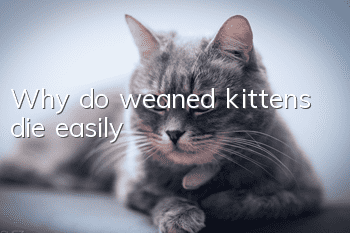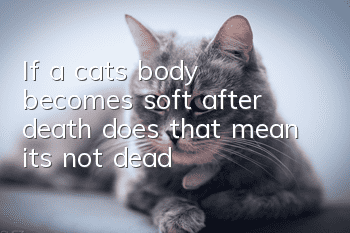Why do weaned kittens die easily?

Many cats are born healthy and their daily lives are relatively stable. In the later stages of weaning, kittens will die suddenly, which has caused great harm to many breeding families, domestic and stray cats. Why do weaned kittens die easily?
Kittens weaned late (5-12 weeks old) are more likely to die from bacterial infections. Most deaths during this period are due to primary infections of the respiratory or gastrointestinal tract and membranous cavities. Kittens usually recover on their own when exposed to bacteria without any emergency. However, when there are adverse factors in the environment or the kitten itself, some disease-related infections will become more severe, which will increase the early mortality of the kitten. This is because neonatal sepsis develops when bacterial infection exceeds the level that a kitten's immune system can fight off. Factors that influence disease include improper nutrition and temperature control, viral infections, parasites, and genetic or developmental defects in the immune system.
A variety of infectious diseases, such as coronavirus, parvovirus, herpesvirus, Carisi virus and reverse green mold virus (infectious peritonitis, feline plague, feline bronchitis, feline influenza and feline leukemia) can cause neonatal cats premature death.
In kittens, roundworm and hookworm infections may also lead to early death. Too many intestinal parasites are harmful to a kitten's growth. Generally speaking, simple external parasitic infections (fleas, ticks) rarely cause death in kittens.
During the breeding process, the loss of kittens is almost inevitable. However, if your veterinarian is able to perform a thorough examination, exam, or EKG and ultrasound scan of your newborn kitten along with a complete blood count, blood biochemistry, urinalysis, and urine or blood bacterial culture, you can effectively treat potentially premature kittens. Death of newborn kitten.
Hematology tests can help diagnose sepsis in newborn cats, including anemia, thrombocytopenia, and hypoglycemia. Other blood chemistry tests can reflect the extent of damage to individual organs.
Once it is determined that the kitten is not viable, it is best to send the kitten to a teaching hospital for euthanasia and autopsy, and sample suspicious tissues or organs for pathogen culture and sectioning, so that doctors can improve their diagnosis through a series of autopsies. Diagnosis of premature death.
Since there is no guarantee that all kittens will survive, we can learn as much as possible about some basic knowledge about cats, and we can prevent inevitable diseases. In case of the next birth, we can take better preventive measures to ensure a higher survival rate for newborn cats.
- What should I do if two cats keep fighting?
- How long does it take for a cat to grow hair after shaving?
- Why do cats hate bathing? Are all cats afraid of water?
- What are the symptoms of Siamese cat pregnancy?
- Main causes of vomiting in cats
- What should I do if my Persian cat suffers from heatstroke? The most important thing for the poop shoveler in summer!
- Master these tips to help your cat remember his name!
- Will cats die if they get rhinitis? How to deal with rhinitis?
- How to properly care for your cat’s teeth?
- What should an owner do when a cat steps on the milk?



